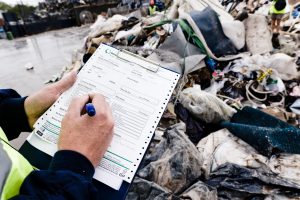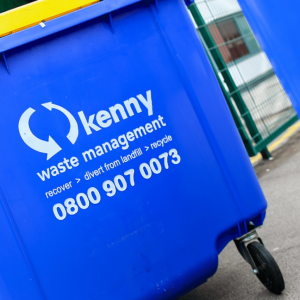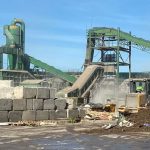At Kenny Waste Management, we process more than 15,000 tonnes of waste every month for our regional clients. For this year’s Recycle Week, we’ll be putting our expertise to task and explaining what recycling means to Manchester’s leading independent total waste management business.
Our core values lead the way:
RECOVER > DIVERT FROM LANDFILL > RECYCLE
We’ve been providing an environmentally safe and controlled waste management service for over 35 years. Our comprehensive waste processing enables us to guarantee that less than 99% of the waste that arrives at our state-of-the-art facility goes to landfill.
Most of the waste we process is prepared by us for recycling, but what does that mean?
What is recycling?
Recycling is the process of aggregating waste and preparing it for another life. Construction waste such as brick, concrete, and stone, for instance, can be crushed into an aggregate and re-used as 6F2. Aggregate is useful as a filler for construction projects in a variety of ways, including general backfill, highway works, and hard standing (for vehicle parking).
Recycle Week is Recycle Now’s flagship annual event, a week dedicated to promoting the benefits of recycling and celebrating recycling efforts all over the UK. Being a sector-leading waste management business, preparing a wide range of materials for use by recyclers, it’s important that we share our specialist knowledge and help spread the message.

Why is recycling important?
The Department for Environment, Food & Rural Affairs (DEFRA) laid out guidance for applying the waste hierarchy in 2011. DEFRA’s waste hierarchy prioritises recycling first, recovery second, and landfill only as a last resort. With the introduction of the landfill tax escalator, recycling also becomes more economically preferable every year.
Recycling helps to reduce landfill by providing a clear alternative. Our accredited secondary markets provide us with services that ensure the vast majority of the waste we process finds a second (or even a third) life.

By preparing waste material for future use, recycling conserves raw natural resources for the future. When new products are manufactured by using recycled material, it means there’s less demand for fresh extraction. Extracting, refining, and processing raw materials, such as crude oil for plastics, can damage ecosystems and pollute nearby waterways.
Recycling protects natural habitats, but it also protects the whole planet by saving energy. Even when the associated costs, such as transport, are accounted for, manufacturing that involves recycled material is generally a carbon saving exercise.
Together, all these savings mean one thing: Less greenhouse gas emissions. Right now, recycling in the UK has been calculated as saving more than 18 million tonnes of CO2 per year – that’s about the same as taking 5 million cars off the road.

Our Recycle Week
Throughout Recycle Week 2021, we’ll be publishing new and informative articles. We’ll be explaining our own processes and delving into the roles our waste partners play in our innovative approach to waste management.
We’re committed to making waste disposal simple and helping your company achieve its sustainability targets. Recycling is important to both sides of that offer. We want to tell you how, why, and what we do to manage your waste sustainably.
Let us know what matters to you
We value transparency, especially between customers and suppliers, and we always welcome queries in regard to what happens to your waste.
If you would like to learn more, follow us on social media or get in touch directly via 0161 790 3737.


